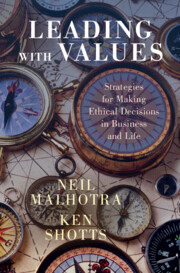Book contents
- Leading With Values
- Leading With Values
- Copyright page
- Dedication
- Contents
- Figures and Tables
- Acknowledgments
- 1 Core Values
- 2 Follow Your Gut?
- 3 Self-Deception and Rationalization
- 4 The Power of the Situation
- 5 Shareholders, Stakeholders, and Societal Institutions
- 6 Weighing Consequences
- 7 Perspective-Taking
- 8 Being Fair
- 9 What Are Your Core Values?
- Notes
- Index
6 - Weighing Consequences
Published online by Cambridge University Press: 27 January 2022
- Leading With Values
- Leading With Values
- Copyright page
- Dedication
- Contents
- Figures and Tables
- Acknowledgments
- 1 Core Values
- 2 Follow Your Gut?
- 3 Self-Deception and Rationalization
- 4 The Power of the Situation
- 5 Shareholders, Stakeholders, and Societal Institutions
- 6 Weighing Consequences
- 7 Perspective-Taking
- 8 Being Fair
- 9 What Are Your Core Values?
- Notes
- Index
Summary
As COVID-19 began to rampage through the world in the spring of 2020, societies began to ask tough questions. Should we keep stay-at-home orders in place, even though economic hardship and unemployment can lead to drug abuse and suicide? Should we maintain distance learning in schools even though it may permanently stunt child development, particularly among disadvantaged populations? Should we reopen businesses, even though doing so may cause the virus to spread and increase deaths? How do we balance the well-being of the elderly, who have the greatest risk of dying from the disease, against the well-being of children, who have their whole lives ahead of them? Others rejected the premises of these questions. Some argued that these were false choices, because the only way to have a thriving economy was to first get the virus under control. On the other side of the spectrum, some downplayed the severity of the virus altogether.
Information
- Type
- Chapter
- Information
- Leading With ValuesStrategies for Making Ethical Decisions in Business and Life, pp. 98 - 112Publisher: Cambridge University PressPrint publication year: 2022
